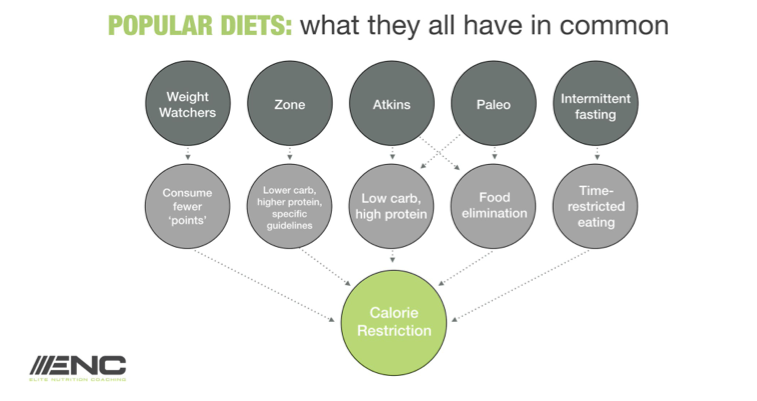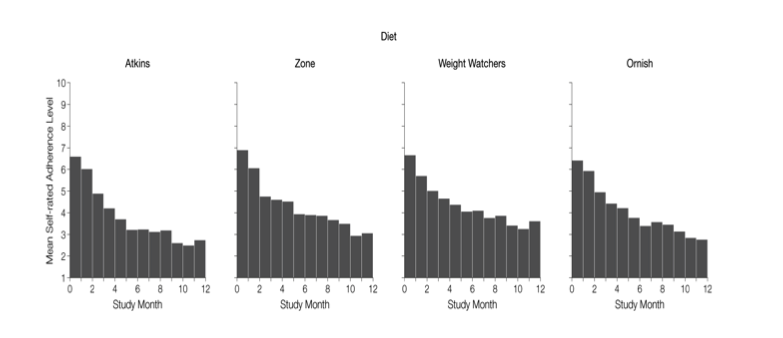
By Joseph Matthews (@JoeJohnMatthews)
Dr Kevin Hall and Dr Scott Kahan’s commentary, titled ‘Maintenance of Lost Weight and Long-Term Management of Obesity’, was recently published in the Medical Clinics of North America journal. Key challenges faced by individuals attempting to maintain weight loss are outlined in the paper (1). These include:
- Appetite changes – “…it has been estimated that for each kilogram of lost weight, calorie expenditure decreases by about 20 to 30 kcal/d, whereas appetite increases by about 100 kcal/d above the baseline level before weight loss (2).”
- Subconscious biases – “…signals to the brain that increase appetite with weight loss could introduce subconscious biases, such as portion sizes creeping upwards over time. Such a slow drift upwards in energy intake would be difficult to detect given the large 20% to 30% fluctuations in energy intake from day to day (3).”
- Increased calorie intake – “…the exponential increase in calorie intake from its initially reduced value is the primary factor that halts weight loss within the first year.”
Changes in appetite and subconscious biases may explain the increase in calorie intake leading to weight regain. Hall and Kahan state that “Low-carbohydrate, high-fat diets may lead to spontaneous reduction in calorie intake and increased weight loss, especially over the short term. Meta-analyses of long-term studies have suggested that low-fat weight loss diets are slightly inferior to low-carbohydrate diets (3), but the average differences between diets is too small to be clinically significant”. This means that the composition of diet may be of lower importance. Indeed, under isocaloric and protein-matched conditions, many different diets have similar efficacy for weight loss outcomes, as seen in the below graphic.

Comparison of effects between popular diets – produced by @JosephAgu.
Across diets, reducing calorie intake is often secondary to behaviour change through the imposed food restrictions, which alter habitual eating habits. For example, an individual may usually eat a chicken and pesto panini and have a latte for lunch (618 kcals). Now, embarking on a low-carbohydrate diet, he or she may choose to eat a chicken salad and an americano (345 kcals). However, over time weight regain can, in part, be explained by the individual finding ways to increase calorie intake within the context of their dietary restrictions. An example of this is adding a dressing to the salad (231 kcal) and whole milk to the americano (30 kcal). This would increase the calorie content of the meal back to what the individual would eat before starting the diet. Another way to do so would be by increasing the portion size of each ingredient, resulting in an overall calorie increase. Dietary non-adherence is also a common factor (5).

The above data from Dansinger et al. (2005) agrees with this hypothesis, where there is a reduced dietary adherence over 12 months (4). It was not clear why adherence rates reduced, but the reductions were comparable across all 4 diets. Participants were assigned the diets, and this is given as a possible explanation for the non-adherence, as they could not freely select the diet options.
A subconscious increase in calories from circumventing rules imposed by dietary restriction is a key factor. There are large discrepancies in the reporting of energy intake and expenditure in overweight individuals self-perceived as ‘diet resistant’. In a classic study, Lichtman et al. (1992) found individuals underreported food intake by 47 ± 16% (1053 kcal/d) and overestimated energy expenditure from physical activity by 51 ± 75% (251 kcal/d). In this paper, the authors concluded: “The failure of some obese subjects to lose weight while eating a diet they report as low in calories is due to an energy intake substantially higher than reported and an overestimation of physical activity, not to an abnormality in thermogenesis” (5).
Evidence of this in the lay context is also available. UK readers may be familiar with the TV documentary ‘Secret Eaters’ in which overweight individuals are filmed by private investigators who identify large discrepancies in their reported vs. actual calorie intakes. When the video is played back to the participants, they are shocked at their overconsumption of food, which they were (often) completely unaware of. It is important to note that such individuals are not actively being dishonest. The misreporting is a product of the quirks of human behaviour. Specifically, Hall and Kahan note: “…it is entirely possible that patients truly believe they are sticking with their diet despite not losing any more weight or even regaining weight.”
The authors conclude that “…long-term success with a weight loss diet may have less to do with biology than factors such as the patient’s food environment, socioeconomics, medical comorbidities, and social support, as well as practical factors, such as developing cooking skills and managing job requirements. Such non-biological factors likely play a strong role in determining whether diet adherence is sustainable.”
As health professionals, we should consider the biological explanations for weight loss and maintenance alongside the quirks in human behaviour that may influence energy intake and/or expenditure. Failing to do so may result in arriving at erroneous conclusions about the cause of initial weight loss or subsequent weight regain. Dietary adherence is key to long-term success. Health professionals should offer a broad spectrum of diet options to better match an individual’s food preferences and lifestyle.
References
- Hall K, Kahan S. Maintenance of Lost Weight and Long-Term Management of Obesity. Med Clin North Am [Internet]. 2018 Jan 1 [cited 2017 Nov 22];102(1):183–97. Available from: https://www.sciencedirect.com/science/article/pii/S0025712517301360
- Polidori D, Sanghvi A, Seeley RJ, Hall KD. How Strongly Does Appetite Counter Weight Loss? Quantification of the Feedback Control of Human Energy Intake. Obesity [Internet]. 2016 Nov [cited 2017 Nov 22];24(11):2289–95. Available from: http://www.ncbi.nlm.nih.gov/pubmed/27804272
- Chow CC, Hall KD. Short and long-term energy intake patterns and their implications for human body weight regulation. Physiol Behav [Internet]. 2014 Jul [cited 2017 Nov 22];134:60–5. Available from: http://www.ncbi.nlm.nih.gov/pubmed/24582679
- Dansinger ML, Gleason JA, Griffith JL, Selker HP, Schaefer EJ. Comparison of the Atkins, Ornish, Weight Watchers, and Zone Diets for Weight Loss and Heart Disease Risk Reduction. JAMA [Internet]. 2005 Jan 5 [cited 2017 Nov 22];293(1):43. Available from: http://www.ncbi.nlm.nih.gov/pubmed/15632335
- Lichtman SW, Pisarska K, Berman ER, Pestone M, Dowling H, Offenbacher E, et al. Discrepancy between Self-Reported and Actual Caloric Intake and Exercise in Obese Subjects. N Engl J Med [Internet]. 1992 Dec 31 [cited 2017 Nov 22];327(27):1893–8. Available from: http://www.ncbi.nlm.nih.gov/pubmed/1454084
Joseph Matthews – PhD Student in Muscloskeletal Physiology at Nottingham Trent University, Sport and Exercise Nutritonist, and Lecturer in Sports Therapy at University College Birmingham. Joe holds a special interest in weight loss and weight gain in combat sport athletes. @JoeJohnMatthews